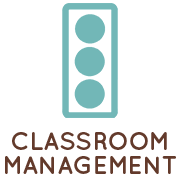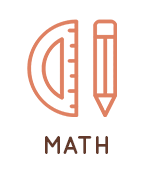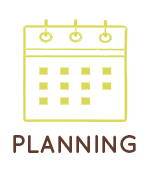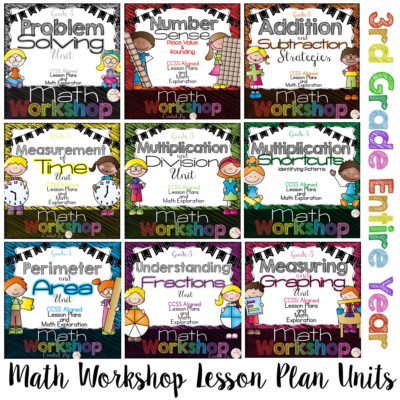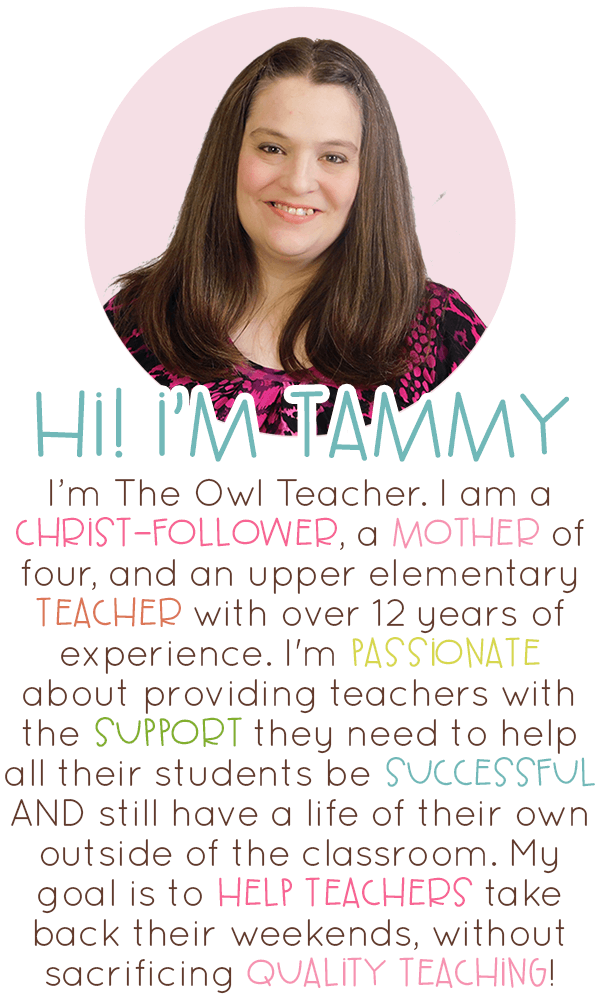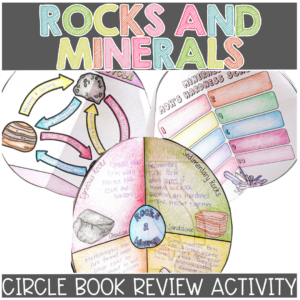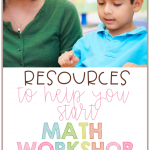
Did your school district recently decide that everyone is now going to start doing the math workshop model? Or, perhaps you aren’t sure of the difference between guided math and math workshop? Do you love reader’s workshop and writer’s workshop, so you wanted to know a little more about math workshop? If you answered yes to any of those, then you are in the right place! I’m dedicating this blog post to telling you all about how to get started with math workshop – today! And guess what? It doesn’t even have to be the beginning of the school year to get started!
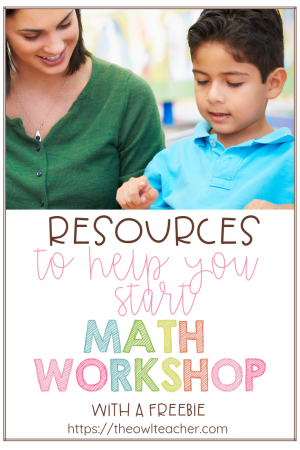
Alright, so I guess I sounded a bit like an infomercial, but I couldn’t help it! I stand 100% behind math workshop because I am in love with it! Let me (try to) tell my story briefly (but we all know I’m long-winded!).
My Math Workshop Story
I was working in a school district where we had just finished implementing writer’s workshop and reader’s workshop. We had been doing them for a few years, and they were very successful. It was time for us to switch over to math. I was apprehensive because, well, to me math is just very black and white. You need to have practice, practice, practice. I couldn’t see this working in math. But even being skeptical, I felt I had to embrace it, because I had administrators who were going to make sure I did. I tried it. I struggled a little bit with it at first. I felt there was just so much information to provide in a mini-lesson. My mini-lessons where what I was calling “maxi-lessons!” I couldn’t cram it all in. I often felt frustrated and wanted to give up. I found myself wanting to just teach the old way when no one was looking. I was feeling like students just weren’t grasping enough of the concepts.
And then the rotations! Oh my goodness. I felt like students were out of control during rotations! I had students in one group who were not working. They were playing around and talking. They were off-task, unless I happened to look at them. Then, they “magically” appeared to be working – until I looked away. Other groups would only get half the work done, or they wouldn’t know where to go for their next rotation. Sometimes managing the groups was just too much for me, week after week of trying to come up with work for them to do in their groups. Sometimes I wouldn’t even get to meet with students in small groups (which, to me, defeated the purpose of rotations), and if I did, I was interrupted frequently!
Fast forward to the future – after following around other teachers, taking a few professional development courses, and reading multiple books, I can honestly say I have it down! Am I an expert at it? No, I don’t think anyone can ever be an expert, as there is always room to learn and grow, but I do feel very secure in what I do know.
I know, just like many trends in education, there are variations to it and no specific one right way. I know that I can show you what works for me, and you will need to adjust it to what works for you and your students.
The Difference Between Math Workshop and Guided Math
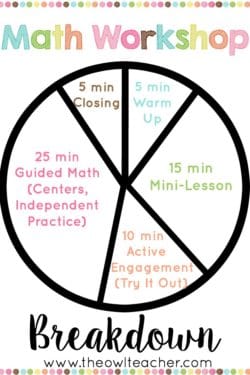
I have seen these words used interchangeably – math workshop and guided math. If you think about it like reader’s workshop, then the workshop is the entire structure in which the mini-lesson is taught, and guided reading is where the teacher meets in small groups with students. Math workshop is set up the same way. Math workshop is the overall model where the warm-up, mini-lesson, guided practice, independent practice, and closing occurs. Guided math is just one piece of math workshop where the teacher meets with students in small groups and differentiates the math to the needs of the students. I really don’t think you can have one without the other, but I suppose I can be wrong.
You can read more about the other specific parts of the math workshop structure from my math workshop series posts.
Getting Started with Math Workshop
Finally – what you were waiting for right!?! I mean, you just read all that above, and it only took you forever to get to the heart of the post. HA. Well, thank you for being patient.
As I said before, you do not have to start math workshop at the beginning of the year. In fact, when I decided to try it the second time around (because my first time flopped!), it was in October. I just told my kiddos, “We are going to give something new a try!” They were all for it. Children are a bit more flexible than you think! (Even those ones like me who can’t stand change!)
When I tackled math workshop – the first time around – I tried to take it all on! BIG MISTAKE! I had, like, five rotations and a bunch of groups and all kinds of crazy stuff. My second time, I didn’t. I started very small. You must, too. If you want it to work, then you have got to believe in yourself and start with baby steps.
Start Small
1.) Only do the mini-lesson part for a few weeks – gather students around the easel or a meeting place, and share a quick mini-lesson concept with them. Model it and provide examples. Together, make an anchor chart. Then, call it good. That will give you a chance to get a feel for mini-lessons and how much you talk (like me – too much – or just right!).
2.) Then, only do the mini-lesson and active engagement. Have students return to their desks and work independently. Phase each stage in through the weeks as you go.
3.) Then, work in the mini-lesson and the active engagement, and only do one rotation, then two. My first week of teaching math workshop, I break the class in half. Half practices a worksheet (review), and the other half I teach a game, such as multiplication top it (multiplication war). Then, we switch. We do this for a week. This gives them practice transitioning and staying on task, and it gives me a chance to correct behavior. After that, phase in another center – so maybe add in a third center, such as flashcards. It’s basic centers at first, just so you can circulate, but the students can still be independent. (And if they finish early, then you can use it as a teachable moment on what to do!)
4.) Lastly, work up to small groups, opening (which is a spiral review), and closing (which is a recap of the lesson).
Management is E-V-E-R-Y-T-H-I-N-G
Remember a bit ago, way, way back at the top when I mentioned I could not handle rotations because the kiddos were off-task or coming over and interrupting? Work wasn’t getting done? Well, that was a management issue on my part. You see, I was so anxious to start this workshop thing, and knowing that they were all familiar with reader’s workshop and writer’s workshop, I didn’t figure I needed to “teach management” for math workshop, too. Plus, they knew my class rules, right?
Well, it turns out that was a lie. I did need to teach the rule. Round 2 taught me for sure I needed to! When I went back at it, I spent almost two weeks making sure that we discussed everything! In fact, I think we spent more time on that than on math. I was nervous about it. I thought for sure the principal would come in at some point and “catch” me and gripe at me for “not teaching math.” I was constantly worried that I would get behind. But, I will tell you that it paid off in the end. I hammered the expectations. We practiced them over and over. Just like above, I phased everything in very slowly!
We talked about math workshop – what it looked like and sounded like. We talked about what it meant to work with others, accountable math talk, and problem-solving. We also discussed what to do when we don’t understand something, when we finish early, and when the teacher is busy, along with expectations and consequences.
Rotations and Time Savers!
For me I don’t have multiple rotations and centers. I only have three. I know when you have a class of thirty, that can get a bit hefty. When that happens, I may opt to break it up into four centers – but no matter what, my centers are ALWAYS consistent! I do not like to have to scramble to find things to put in multiple centers. I like low prep. My centers were:
1.) Fact Fluency – All students need practice with their facts. They need to memorize them. Point. Blank. This can be games (if you want to do that work), it can be flash cards, it can be practice sheets, or it can be whatever you feel like. Mix it up, but make it fact fluency!
2.) Me – Come see the teacher and let’s focus on your individual needs. This was my extension of the mini-lesson, my remediation of it (or even the foundations before it!), or my continuation of it.
3.) Practice – This is where my students completed the activity related to the mini-lesson. For me this is usually a hands-on activity, a game, applied math, or something of the like. Students usually work in partners, and once they have completed it, they work on the independent practice – independently! Sometimes the independent sheet goes home for homework, or we check it during the closing.
If you need a fourth center – make it the independent practice sheet – “seat work” they call it, right? Of course, never grade anything that students haven’t had a lot of time to practice with first.
Sorry – nothing fancy here. But you see, I’m really only prepping for one center – the practice (which you would do anyway if you were planning a regular math class). And, well, the guided math or me/meet with teacher is just the differentiated portion, but sometimes you can’t plan for that until you get in front of the student to know what they need.
Final Thoughts…
If you have read this far, I am extremely impressed! I don’t think I have ever written this much. It’s funny, when I sat down, I thought, “I’ll just write a quick blog post…”
As I have said in my about page (and many other places), I use to get to work early every day to plan and get work done, then I’d stay after for another hour each day. Then, I would carry home a hefty bag each night and crack it open while watching TV and still not complete all the work and demands on me as a teacher. It seemed I still always needed to go in on Saturday to finish up planning, prepping, and copying for the next week. It got exhausting, and I felt burned out quickly. I missed the excitement I felt toward teaching – I missed my family. I missed living life.
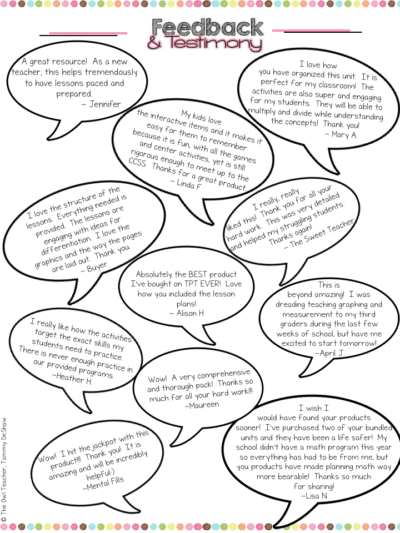
I am all about saving time and helping you save time. I want to put a few more hours back into your week so you can spend time with your family, do the things you enjoy, and continue to have that passion for teaching!
You can implement math workshop in your classroom (any time of the year!) and save time each week without the frustration and overwhelming feeling of stress with my complete math workshop units! These units are engaging and have everything you need – pretests, post-tests, vocabulary cards, scripted lesson plans with a scope and sequence, warm-up activities (spiral review!), active engagement, interactive notebook pieces, math centers, independent practice, mini-assessments, and so much more! You can watch your students excel at math, without losing your insanity!
Just check out SOME of the feedback.
Click here to download a free information packet!
You can read about many of the math activities found in the math workshop units on my blog by clicking “Curriculum” and “Math” up in the top menu.
You can also check out the ENTIRE Math Workshop Bundle in my store by clicking here or click here to download a free sample of math workshop!
Do not do more than you have to! If your students are still learning – it’s good enough! Do NOT think it needs to be better! Believe in yourself and your students – and just start small!


